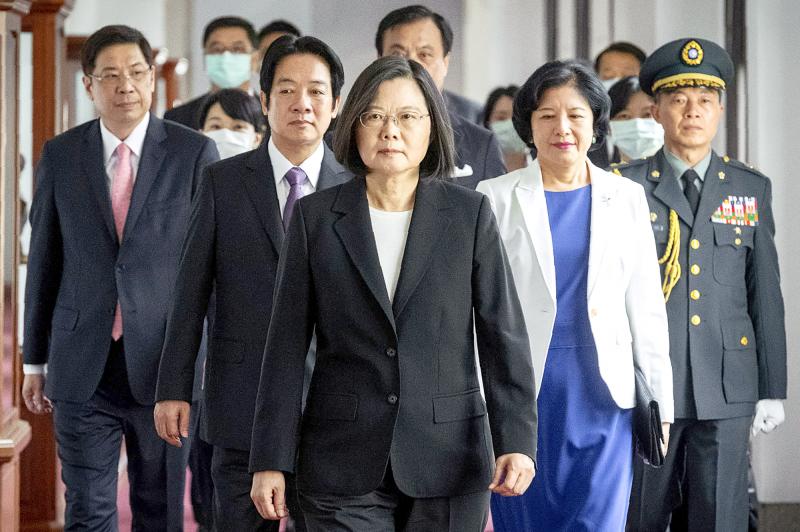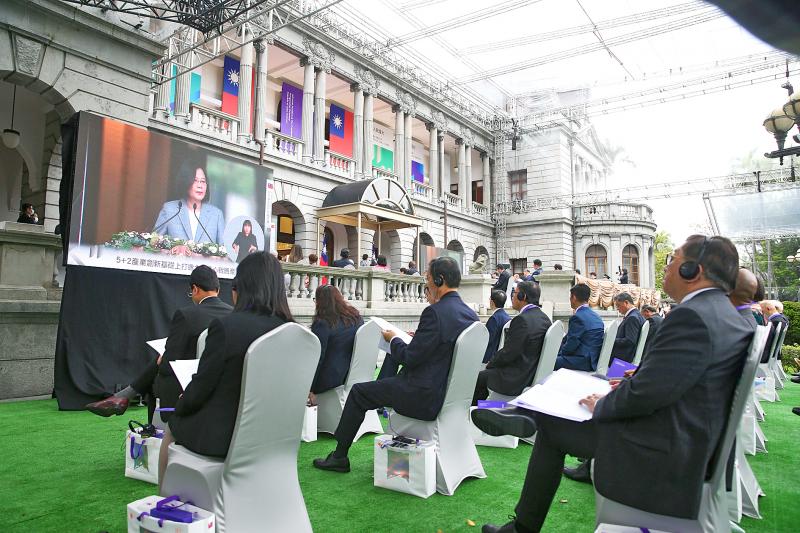President Tsai Ing-wen (蔡英文) in her inaugural address yesterday vowed to continue efforts to push for peace and stability in the Taiwan Strait, adding that the nation would not accept Beijing’s “one country, two systems” framework.
Tsai and Vice President William Lai (賴清德) were sworn in yesterday morning at the Presidential Office Building in Taipei.
Following the swearing-in ceremony, Tsai delivered her second inaugural address from a podium in front of the nearby Taipei Guest House.

Photo: AP / Presidential Office
Tsai spoke on four major topics: industrial development, social safety, national security and the strengthening of Taiwan’s democracy.
Highlighting the importance of optimizing government institutions, she said that the Legislative Yuan is to establish a constitutional amendment committee that would provide the nation with “a platform to engage in dialogue and reach a consensus on constitutional reforms pertaining to government systems and people’s rights.”
“This democratic process will enable the constitutional system to progress with the times and align with the values of Taiwanese society,” she said.

Photo: CNA
Calling it a bipartisan issue, she said that a proposal to lower the voting age in Taiwan from 20 to 18 should be prioritized.
Under the Constitution, only citizens older than 20 have the right to vote in elections.
Tsai said that despite a National Congress on Judicial Reform and making legislative amendments, which serve as “base work for the further improvement” of the judicial system, there is still a gap between what has been achieved in terms of judicial reform and what the public expects.
She promised to continue to listen to different opinions, saying that the public’s dissatisfaction is what drives reform.
A lay judge system needed to be implemented, to help bridge the gap between the people and the judicial system, Tsai said.
While emphasizing the need to “mend” the nation’s social safety net, Tsai said that she would improve the social care system and the work environments of front-line social workers so that they could “identify people who have fallen through” the net.
Regarding controversies triggered by specific cases, she said: “We cannot hold medical agencies or individual judges solely responsible,” and called on the judicial and executive branches of the government to re-evaluate their systems.
A digital development agency is to be created as part of the Executive Yuan’s organizational reform — a process which would include “adjustments to all ministries in line with current needs,” Tsai said.
The establishment of the Control Yuan’s National Human Rights Commission in August would mark a “milestone in our journey to place human rights at the center of Taiwan’s national ethos,” and the beginning of a “new chapter” for the Control Yuan, she added.
As for cross-strait relations, they have “reached a historical turning point,” Tsai said.
Taiwan and China each have a responsibility to “find a way to coexist,” and “prevent the intensification of antagonism and differences,” she said.
Over the past four years, Taiwan has “made the greatest effort to maintain peace and stability in the Taiwan Strait,” she said.
“We will continue these efforts, and we are willing to engage in dialogue with China and make more concrete contributions to regional security,” she said.
However, she added: “We will not accept the Beijing authorities’ use of ‘one country, two systems’ to downgrade Taiwan and undermine the cross-strait status quo.”
Tsai also called for active international participation, saying that Taiwan has been praised throughout the COVID-19 pandemic for its “selfless assistance to the international community.”
“Over the next four years, we will continue to fight for our participation in international organizations, strengthen mutually beneficial cooperation with our allies, and bolster ties with the United States, Japan, Europe and other like-minded countries,” she said.

Right-wing political scientist Laura Fernandez on Sunday won Costa Rica’s presidential election by a landslide, after promising to crack down on rising violence linked to the cocaine trade. Fernandez’s nearest rival, economist Alvaro Ramos, conceded defeat as results showed the ruling party far exceeding the threshold of 40 percent needed to avoid a runoff. With 94 percent of polling stations counted, the political heir of outgoing Costa Rican President Rodrigo Chaves had captured 48.3 percent of the vote compared with Ramos’ 33.4 percent, the Supreme Electoral Tribunal said. As soon as the first results were announced, members of Fernandez’s Sovereign People’s Party

EMERGING FIELDS: The Chinese president said that the two countries would explore cooperation in green technology, the digital economy and artificial intelligence Chinese President Xi Jinping (習近平) yesterday called for an “equal and orderly multipolar world” in the face of “unilateral bullying,” in an apparent jab at the US. Xi was speaking during talks in Beijing with Uruguayan President Yamandu Orsi, the first South American leader to visit China since US special forces captured then-Venezuelan president Nicolas Maduro last month — an operation that Beijing condemned as a violation of sovereignty. Orsi follows a slew of leaders to have visited China seeking to boost ties with the world’s second-largest economy to hedge against US President Donald Trump’s increasingly unpredictable administration. “The international situation is fraught

MORE RESPONSIBILITY: Draftees would be expected to fight alongside professional soldiers, likely requiring the transformation of some training brigades into combat units The armed forces are to start incorporating new conscripts into combined arms brigades this year to enhance combat readiness, the Executive Yuan’s latest policy report said. The new policy would affect Taiwanese men entering the military for their compulsory service, which was extended to one year under reforms by then-president Tsai Ing-wen (蔡英文) in 2022. The conscripts would be trained to operate machine guns, uncrewed aerial vehicles, anti-tank guided missile launchers and Stinger air defense systems, the report said, adding that the basic training would be lengthened to eight weeks. After basic training, conscripts would be sorted into infantry battalions that would take

GROWING AMBITIONS: The scale and tempo of the operations show that the Strait has become the core theater for China to expand its security interests, the report said Chinese military aircraft incursions around Taiwan have surged nearly 15-fold over the past five years, according to a report released yesterday by the Democratic Progressive Party’s (DPP) Department of China Affairs. Sorties in the Taiwan Strait were previously irregular, totaling 380 in 2020, but have since evolved into routine operations, the report showed. “This demonstrates that the Taiwan Strait has become both the starting point and testing ground for Beijing’s expansionist ambitions,” it said. Driven by military expansionism, China is systematically pursuing actions aimed at altering the regional “status quo,” the department said, adding that Taiwan represents the most critical link in China’s